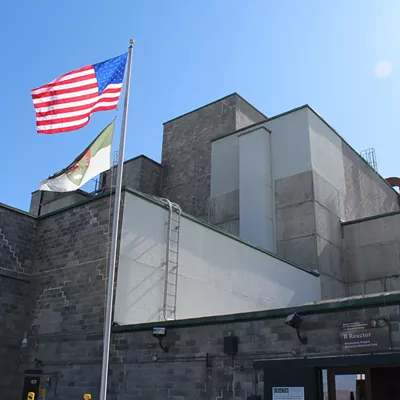The Hanford Nuclear Reservation in Eastern Washington is the most polluted site in the Western Hemisphere and the biggest environmental cleanup site in the United States. The federal Department of Energy (DOE) has been charged with the cleanup of 450 billion gallons of high-level radioactive material -- enough to make a 25-foot deep lake the size of Seattle. Environmentalists, nearby residents, consumer rights advocates and the state of Washington pushed the DOE and Hanford to upgrade cleanup standards and follow through with existing cleanup plans; but according to the Washington Public Interest Research Group, Hanford was recently fined more than $250,000 for accepting hazardous waste from North Carolina without telling people or checking the waste through required protocol. It's this kind of carelessness, say cleanup advocates, that makes Initiative 297 so important.
On the ballot this November is Initiative 297, which, if passed, would prevent out-of-state hazardous wastes from being shipped to Hanford until the existing contamination is cleaned up.
"It's a common-sense initiative," says Robert Pregulman, executive director of WashPIRG. "Before you bring any more [hazardous waste] in, clean up what you already said you were going to clean up."
In addition, the initiative would keep the DOE from designating places in Washington state as national radioactive waste dumps. I-297 would also increase the amount of public participation in the cleanup and carry stricter guidelines for cleanup procedures. Sounds great, right? Well, not everyone is happy about it, including 4th District Republican Congressman Doc Hastings, who claims that I-297 would only complicate the already bureaucratized cleanup efforts at Hanford. He claims that if Washington state passes a law preventing other states from sending their hazardous waste past our borders, it'll only be a matter of time before we won't be able to ship any of our waste across theirs. Hastings' press secretary wouldn't comment, but referred to a speech Hastings made to the Tri-Cities Chamber of Commerce in August.
"The fundamental failure of I-297 is that while it tries to keep waste from coming into Washington state, it gambles all of Hanford's massive volumes of nuclear waste that other states won't do the same thing," Hastings told the chamber. "If Washington loses the gamble, then we may get to forever keep the 90 percent of Hanford waste currently headed out of the state." Hastings explains that while 90 percent of the waste at Hanford is scheduled to be moved out of Washington, just 1 percent of Hanford's waste came in from across the border, making it extremely risky to set a precedent on refusing out-of-state waste.
But Pregulman disagrees. He says other states, like New Mexico, have already passed laws preventing hazardous wastes from entering their borders, and no other states are retaliating.
"Historically, [Hastings] has supported whatever folks that run Hanford support, so it's certainly not surprising," Pregulman says, regarding the congressman's stance on I-297.
TRIDEC, the Tri-City Industrial Development Council, is also against I-297. Like Congressman Hastings, TRIDEC says even though the initiative sounds like a positive step for Hanford, it's a big waste of time and money for the state. TRIDEC says that if the initiative passes, the DOE will sue Washington, creating a lengthy, costly battle, slowing cleanup efforts at Hanford. Cleaning up Hanford is the driving force of the Tri-Cities economy. Of course, advocates disagree, claiming I-297 simply aims to prevent Hanford from getting worse before it gets better. So far, it seems like the public agrees.
"Initial polling show 70 percent of the people we spoke with are supporting it," Pregulman says. "Our opponents will launch a 'no' campaign, but people in Washington are really tired of the fact that the DOE has broken promise after promise," he says, referring to violations in the cleanup plan and recent changes in the way the federal government defines hazardous wastes, which allows certain types of waste to be left in unlined trenches or not cleaned up.
And the federal government is currently struggling to find places to safely dispose of radioactive waste from a variety of sites. The Yucca Mountain plan in Nevada has run into significant opposition; some activists fear Hanford will also become targeted as a dumpsite. I-297 wasn't written specifically to counteract that possibility, but it is designed to counter a public agency -- the DOE -- that they regard as unpredictable.
"The DOE and overseers of Hanford have done a horrible job, broken promise after promise," Pregulman argues. "They have a significant plan to cut corners on how much waste they are cleaning up and they'd like to cut funding on how much they spend on cleanup. Frankly, [I-297] requires them to do what they should have been doing all along. All of us have been told to clean up our rooms before we make another mess, and that's all we want the DOE to do as well."




















